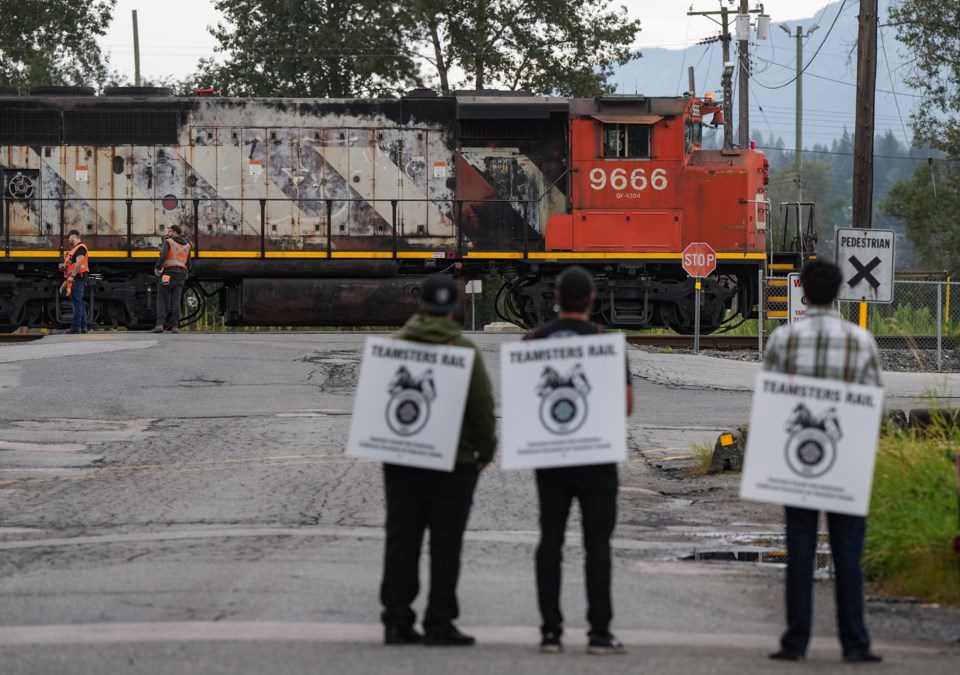MONTREAL — Workers’ rights are once again under the microscope after last week’s massive railway work stoppage was abruptly halted when the federal government intervened less than 17 hours after the shutdown began.
Ottawa’s decision to step in, particularly after Labour Minister Steven MacKinnon repeatedly stressed the benefits of deals hashed out at the negotiating table, has critics questioning whether such moves pose a threat to employees’ bargaining power — while defenders emphasize intervention for the sake of businesses and workers alike.
Rail shipments and commuter trains ground to a halt at 12:01 a.m. on Aug. 22 after Canadian National Railway Co. and Canadian Pacific Kansas City Ltd. locked out 9,300 rail workers following months of talks that failed to produce new contracts.
As fears of a supply chain breakdown mounted, MacKinnon directed the federal labour board later that day to impose binding arbitration and order the two railways and their workers to resume operations. The arm’s-length tribunal did as told, and trains had started to chug at both major railways by Monday morning.
MacKinnon defended the order, framing it as a relief to employees across sectors.
“It’s hard to remember a decision that was more in the interest of Canadian workers,” the minister said that day.
“When you think of shutdowns in potash mines, when you think of car plants running out of inventory, when you think of forestry and aluminum operations ... those are major economic consequences, and there are also major consequences in terms of salaries for unionized workers across the country.”
Some academics, labour advocates and politicians saw things differently, viewing the minister’s action as a breach rather than a boon.
Margot Young, a law professor at the University of British Columbia, said the decision undermines employees’ collective bargaining rights and reduces companies’ motivation to negotiate in good faith.
As Young sees it, snarled supply chains do not undercut a strike’s justification; they heighten the job action’s potency.
“That’s the whole point,” she said. “That’s actually what lends the workers leverage. If it were not inconvenient, then there would be no bargaining power for the workers.”
A pattern of swift intervention from Ottawa could tip the labour relations scale in favour of employers, some experts said.
“What’s the incentive to bargain if you know that the federal government’s going to intervene?” asked Charles Smith, a labour scholar at the University of Saskatchewan.
The balance of those labour scales bears greatly on the country’s economy, given rail’s status as a commercial lifeline.
Trains haul about $1 billion worth of freight each day, according to the Railway Association of Canada. More than half of all exports move by rail. The cargo ranges from car parts to crude oil, grain to consumer goods, aluminum to zinc.
A two-week rail strike would have cost the country $3 billion in economic output this year, according to the Conference Board of Canada. Nearly half of that total would come from employee income losses, it said.
Rail’s outsized role on the economic stage has prompted politicians to step in during past labour dramas as well.
Back-to-work legislation — either threatened or passed — put the brakes on strikes at Canadian Pacific in 2012 and 2015.
The four joint strikes at Canadian National and Canadian Pacific in 1950, 1966, 1973 and 1987 all ended with emergency bills, passed by Liberal and Conservative governments. But most of the walkouts lasted a week or more.
The trend has led to what political scientists Leo Panitch and Donald Swartz have called “permanent exceptionalism” by governments that intervene in labour standoffs while affirming their belief in collective bargaining.
An even quicker fail-safe than back-to-work legislation is a provision under the Canada Labour Code, which MacKinnon drew on last week. Section 107 allows the labour minister to “direct the (labour) board to do such things as the minister deems necessary ... to maintain or secure industrial peace” — such as ending a work stoppage via binding arbitration.
Rarely has the clause been invoked so quickly.
Unlike back-to-work bills, which require legislators who represent their constituencies to cast a ballot, the provision places a great deal of power in one person’s hands.
“Both the Liberals federally and the Conservatives, especially under Harper, used back-to-work legislation all the time. But at least they had to go through the House,” said Peter McInnis, a labour historian at St. Francis Xavier University.
A contract drawn up by an arbitrator also needs no approval from union membership, unlike deals hammered out at the bargaining table, which require member ratification.
“It’s very anti-democratic,” McInnis said. “Your workers don’t get to vote on the tentative agreement.”
A shutdown that threatens the economy may force a strong hand from Ottawa, he added. But the price of federal intervention may be a battered belief in collective bargaining.
“I don’t know if it’s a bad precedent. But it's a cumulative thing, and you kind of lose faith.”
However, after nine months of negotiations and growing acrimony between the parties, they remained very far apart on a deal, according to railway and Teamsters sources who were not authorized to speak publicly.
Earlier this week, Prime Minister Justin Trudeau defended his government’s decision to step in, saying it was made “reluctantly” and out of necessity.
“Unfortunately, CN and CPKC took the deeply unhelpful decision last Thursday to lock out employees after talks reached an impasse,” Trudeau said.
“That ... raised serious public safety concerns, with everything from propane for remote hospitals to chlorine for safe drinking water being transported on our rails.”
The balance — of negotiating power and economic well-being — remains delicate.
This report by The Canadian Press was first published Aug. 30, 2024.
Companies in this story: (TSX:CNR, TSX:CP)
Christopher Reynolds, The Canadian Press



